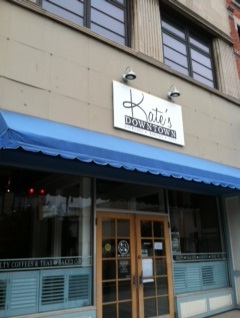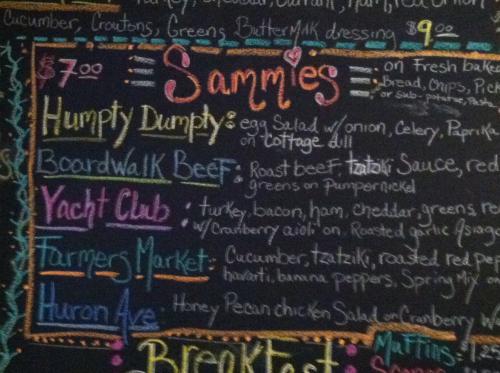Port Huron café sources locally
Kate’s Downtown Café sets example for building local community support.
When one thinks of Port Huron, they might think of summer, the Port Huron to Mackinac Boat race, more boats, marinas, and the Vantage Point Farmers Market; now you can think of Kate’s Downtown Café when reminiscing about a trip to the sunrise side of Michigan.

Stop in on any weekday morning for espresso and people are lined up at the counter ordering their special cup from owner, Kate Voss. She serves it up, calling customers by name and passing their order with a great big smile. Homemade scones, muffins and other pastries look inviting and taste great with Voss’s coffee.
Kate’s is on the main street in downtown Port Huron, close to county administration buildings, the marinas, and loft apartments and offers a warm cheery atmosphere and space. But this isn’t your typical downtown café. On the wall-sized blackboard, Voss lists the local farmers and businesses from which she sources her food products – as many as she can get from St. Clair County, – for everyone to see. Also on the board is her daily menu of breakfast quiche and hot cereals, Sammies (sandwiches) and salads that are offered for lunch. Voss strives to locally source all of her food products, - from fresh produce to the eggs and meat she uses in sandwiches, salads and breakfast.
Voss describes her business as a farm to table upscale café, bakery and espresso bar. She wanted to support her community and felt that fresh from the farm food tastes better. No one else had this type of restaurant in the area when she opened in October 2012. She offers gluten free/vegan/vegetarian options and most foods are organic or grown sustainably. Voss has been able to find meat, cheese, bread, flour, cream, eggs, milk, butter, broccoli, honey, coffee, tea, greens, sugar, pickles, and cream cheese locally. Tomatoes and out-of-season fruits were some of the items that were difficult to find locally, which has forced her to plan seasonal menus based on what is available. She and her chefs have decided if it is not available they will not use it.
Voss and her chefs found farmers through research both online and by word of mouth. They started at the Vantage Point Farmers Market and found Toad Hall Farm and then found Sharkar Farms online. The chefs pick up some of their produce and food products directly from the farm and other produce is delivered once or twice a week. How do you get fresh produce in the winter in Michigan? Both Toad Hall Farm and Sharkar Farms decided to expand their farm businesses with greenhouses and hoop houses and they now can grow greens for salads and sandwiches all winter long and extend the growing season of several vegetables for several months.
What do the farmers think of Kate’s efforts to source local food? Sharon Ostrowski of Sharkar Farms in Marine City has been looking to develop new markets for the last couple of years. She has been involved with the Michigan State University Extension’s Farm to School efforts, selling to several schools and Kate’s Downtown is her first restaurant. Ostrowski says, ”We welcomed the income during the winter months and are hoping we can find more items to grow in the hoophouse next winter so the restaurant has a better variety.” Missy VanWormer of Toad Hall Farm, initially sold greens, squash, dry goods, mushrooms, eggs, strawberries, cherry tomatoes, herbs, figs, onions and edible flowers. VanWormer then partnered with Heavenly Acres Greenhouses and was able to provide more greens and herbs through the winter.
Both farmers feel that if they could get 3-4 more restaurants, this type of year-round farming would be a good source of income. “I feel I am helping to build a stronger community. You make sure you send out only the best of what you have because you personally know who it’s going to and that helps build a good reputation," stated VanWormer. As other farmers start to look at new markets like this one, both Ostrowski and VanWormer recommend working with Michigan State University Extension Educators to identify resources to develop a food safety plan, review your farm liability insurance, and identify which products you can consistently source.
Kate’s Downtown chefs have visited both farms; they know where the food is coming from and how the farmers are growing it. Voss says it is hard when produce is not available and it is hard to find produce that fits their standards. She says, “It is financially hard to go fresh and organic and it would be cheaper to have a big truck pull up and unload a bunch of frozen food in plastic bags but that is not what we wanted to do.” She says the customers have responded in wonderful ways and support the niche she is trying to fill. They hope to have the continued support of the community, “so we can keep our superior grade food at the same level and better,” she added.
At the end of the day, when asked what the best part of owning her business is, Kate Voss replies, “It’s how happy our café makes people; it really is an oasis of good energy. My staff rocks in so many ways… I love my job and I love looking out at the café from behind the espresso machine and being able to name almost every person in a filled café – We are friends and a true community in the café; it’s pretty cool!”



 Print
Print Email
Email



